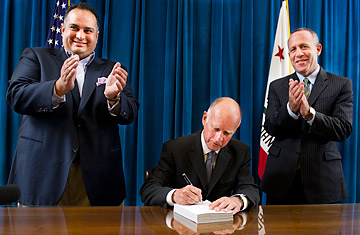
California Governor Jerry Brown, center, signs the state budget at the state capitol in Sacramento, Calif., on June 30, 2011
It sounded great in June. California leaders had finally found a solution to the budget crisis without resorting to the usual loopholes that only temporarily cover up problems. Or had they? Less than two months later, it looks as though they actually did go for the short-term fix, only in a different form — thanks to stock-market volatility.
With the threat of losing their paychecks if they were tardy in delivering a budget, under-the-gun lawmakers came up with a quick solution that factored in an expected $4 billion in additional windfall revenue from an improving economy. Fast-forward to August: amid the nation's first ever credit downgrade, the stock market has had its worst week since the depths of the Great Recession. That windfall isn't looking so hot. Another problem: the legislators' solution declared that if the revenue failed to materialize, the budget had built-in "triggers" that would make further cuts of about $2.5 billion.
"They're so far off the mark, there's not a chance in hell they're going to come up with the money they thought they were going to come up with," says Christopher Thornberg of Beacon Economics, an economic-research and consulting firm in California. "That was a pie-in-the-sky forecast before everything happened over the past couple days. So now it's gone from pie-in-the-sky forecast to utterly impossible."
The plunge on Wall Street is especially bad for California revenue, because the Golden State is more reliant than most states on capital-gains taxes on profits from stock-market investments. That's because a relatively high percentage of the state's taxpayers are wealthy individuals, who tend to invest more. California also draws more on personal income taxes, because it relies less on property taxes and has a narrower sales tax base than, say, Texas, according to Thornburg.
State Controller John Chiang didn't lighten the mood at all when he announced on Aug. 11 that in July — before the stock-market mess even began — the state's tax revenue was $539 million, or 10.3%, lower than what was projected in the budget. The outlook doesn't look good for the coming months either, judging by the Federal Reserve's statements on Tuesday, Aug. 9. The Fed said growth nationwide has been "considerably slower" than expected so far this year, as consumer spending was flat, the housing sector was depressed, and unemployment rose.
This may be dire for California. If revenues fall short by more than $1 billion, the state will slash $600 million from universities, libraries, child care, health care and other services, starting in January. If revenues miss the mark by $2 billion, schools will give up an additional $1.9 billion and see grim measures such as a shortening of the school year by seven days. That would occur after the budget that was passed in June already called for cuts to universities and the judiciary, and after lawmakers approved $11 billion in total cuts in March. "While we hope for better news in the months ahead, every drop in revenues puts us closer to the drastic trigger cuts that could be imposed next year," Chiang said.
So what will the state's leaders do? Probably nothing until next year, says Esmael Adibi, director of the Anderson Center for Economic Research at Chapman University in Orange County. After failing this year, Governor Jerry Brown may succeed in 2012 at persuading Republicans to put an initiative on the ballot to raise sales taxes. If voters say yes, the state will have more revenue. But that would be too late to save schools and social services from the triggers unless there's a dramatic economic turnaround this year. Adibi points out that job creation is improving in California, albeit at a slow pace. But he projects that it will give the state only around $2 billion of the projected $4 billion. "They're all counting on this revenue realization to come in and solve the problem," Adibi says. "But obviously the economy is not improving as fast as they wish. Consequently, that revenue is not going to be there."
